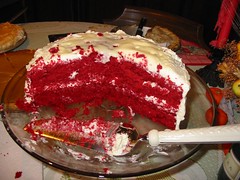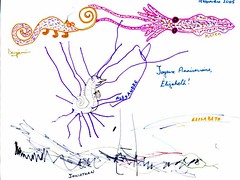Wednesday, November 30, 2005
Monday, November 28, 2005
Origins of the "Advent Wreath"
Advent wreaths light up holiday
Advent means a great deal for German Christians of both Protestant and Roman Catholic confession. It is a time of quiet contemplation which begins on the fourth Sunday before Christmas Day.
The festive advent wreath, usually decorated with four candles but sometimes with only one, has its roots in the northern city of Hamburg. In German homes, one of the most popular symbols of the season is the evergreen advent wreath.
The festive wreath, usually decorated with four candles, has its roots in the northern city of Hamburg, where in 1839 the very first advent wreath was hung in the prayer hall of the Rauhes Haus charity.
To begin with, the circular wreath of pine branches found favor in the homes of Protestant families, particularly those living in northern Germany. In the 1920s, though, Roman Catholics began to adopt the custom, too.
Originally decorated with 24 candles — one for each day of Advent — the number has long been reduced to four. Some people even prefer just a single candle.
Yet the older tradition lives on in the form of the Advent or Christmas calendar with 24 windows on its face. It, too, is a German invention which became a custom around the turn of the century and has advanced to worldwide popularity over the past 50 years.
The windows or small doors which denote each day open to reveal sweets or other small gifts.
In Germany, much effort goes into most of the calendars. One of the largest of them all stands in the center of the southern German town of Gengenbach, where 24 windows of the town hall are decorated with festive motifs.
From "The Week in Germany" [info@germany.info]
Advent means a great deal for German Christians of both Protestant and Roman Catholic confession. It is a time of quiet contemplation which begins on the fourth Sunday before Christmas Day.
The festive advent wreath, usually decorated with four candles but sometimes with only one, has its roots in the northern city of Hamburg. In German homes, one of the most popular symbols of the season is the evergreen advent wreath.
The festive wreath, usually decorated with four candles, has its roots in the northern city of Hamburg, where in 1839 the very first advent wreath was hung in the prayer hall of the Rauhes Haus charity.
To begin with, the circular wreath of pine branches found favor in the homes of Protestant families, particularly those living in northern Germany. In the 1920s, though, Roman Catholics began to adopt the custom, too.
Originally decorated with 24 candles — one for each day of Advent — the number has long been reduced to four. Some people even prefer just a single candle.
Yet the older tradition lives on in the form of the Advent or Christmas calendar with 24 windows on its face. It, too, is a German invention which became a custom around the turn of the century and has advanced to worldwide popularity over the past 50 years.
The windows or small doors which denote each day open to reveal sweets or other small gifts.
In Germany, much effort goes into most of the calendars. One of the largest of them all stands in the center of the southern German town of Gengenbach, where 24 windows of the town hall are decorated with festive motifs.
From "The Week in Germany" [info@germany.info]
Friday, November 25, 2005
The Center of Attention
The photographer paid the price on Thanksgiving for neglecting to keep his batteries charged, so out of 20 shots, only two or three turned out properly. This one captures the activities of a certain person who kept everyone's eyes on her for a good bit of the afternoon.
Thursday, November 24, 2005
Thanksgiving Proclamation
The 1st National Thanksgiving Proclamation , November 1, 1777
By the Continental Congress
FORASMUCH as it is the indispensable duty of all men to adore the superintending Providence of Almighty God; to acknowledge with gratitude their obligation to Him for benefits received, and to implore such farther blessings as they stand in need of; and it having pleased Him in His abundant mercy not only to continue to us the innumerable bounties of His common Providence...
IT IS THEREFORE recommended to the legislative or executive powers of these United States, to set apart Thursday, the eighteenth day of December next, for solemn thanksgiving and praise;
THAT with one heart and one voice the good people may express the grateful feelings of their hearts and consecrate themselves to the service of their Divine Benefactor; and that together with their sincere acknowledgments and offerings, they may join the penitent confession of their manifold sins, whereby they had forfeited every favour, and their humble and earnest supplication that it may please God, through the merits of Jesus Christ, mercifully to forgive and blot them out of remembrance;
THAT it may please Him graciously to afford His blessing on the government of these states respectively, and prosper the public council of the whole; to inspire our commanders both by land and sea, and all under them, with that wisdom and fortitude which may render them fit instruments, under the Providence of Almighty God, to secure for these United Sates, the greatest of all human blessings, independence and peace.
THAT it may please Him, to prosper the trade and manufactures of the people, and the labour of the husbandman, that our land may yet yield its increase; to take schools and seminaries of education, so necessary for cultivating the principles of true liberty, virtue and piety, under His nurturing hand, and to prosper the means of religion for the promotion and enlargement of that kingdom which consisteth "in righteousness, peace and joy in the Holy Ghost."
AND IT IS further recommended, that servile labour, and such recreation as, though at other times innocent, may be unbecoming the purpose of this appointment, be omitted on so solemn an occasion.
By order of Congress
Henry Laurens, President
By the Continental Congress
FORASMUCH as it is the indispensable duty of all men to adore the superintending Providence of Almighty God; to acknowledge with gratitude their obligation to Him for benefits received, and to implore such farther blessings as they stand in need of; and it having pleased Him in His abundant mercy not only to continue to us the innumerable bounties of His common Providence...
IT IS THEREFORE recommended to the legislative or executive powers of these United States, to set apart Thursday, the eighteenth day of December next, for solemn thanksgiving and praise;
THAT with one heart and one voice the good people may express the grateful feelings of their hearts and consecrate themselves to the service of their Divine Benefactor; and that together with their sincere acknowledgments and offerings, they may join the penitent confession of their manifold sins, whereby they had forfeited every favour, and their humble and earnest supplication that it may please God, through the merits of Jesus Christ, mercifully to forgive and blot them out of remembrance;
THAT it may please Him graciously to afford His blessing on the government of these states respectively, and prosper the public council of the whole; to inspire our commanders both by land and sea, and all under them, with that wisdom and fortitude which may render them fit instruments, under the Providence of Almighty God, to secure for these United Sates, the greatest of all human blessings, independence and peace.
THAT it may please Him, to prosper the trade and manufactures of the people, and the labour of the husbandman, that our land may yet yield its increase; to take schools and seminaries of education, so necessary for cultivating the principles of true liberty, virtue and piety, under His nurturing hand, and to prosper the means of religion for the promotion and enlargement of that kingdom which consisteth "in righteousness, peace and joy in the Holy Ghost."
AND IT IS further recommended, that servile labour, and such recreation as, though at other times innocent, may be unbecoming the purpose of this appointment, be omitted on so solemn an occasion.
By order of Congress
Henry Laurens, President
Tuesday, November 22, 2005
Neue Kanzlerin
Some of the participants in this blog are familiar with Germany. I know you've been wondering how to address the new Chancellor, should you happen to meet her. Fortunately the Deutschland Nachrichten newsletter has considered the problem and offers the following suggestions:
WIE SPRICHT MAN ANGELA MERKEL KORREKT AN?
Der Ratgeber des Protokolls Inland der Bundesregierung empfiehlt als Anrede "Frau Bundeskanzlerin". Eine offizielle Regel ist das zwar nicht. Stilexperten betonen aber, dass schon die Höflichkeit die weibliche Form gebiete. Die korrekte Anrede in einem Brief an die künftige Kanzlerin lautet: "Sehr geehrte Frau Bundeskanzlerin", beziehungsweise für den internationalen Schriftverkehr "Ihrer Exzellenz der Bundeskanzlerin der Bundesrepublik Deutschland Frau Dr. Angela Merkel".
Since we might write her from our own country, I would suggest using that last formula.
WIE SPRICHT MAN ANGELA MERKEL KORREKT AN?
Der Ratgeber des Protokolls Inland der Bundesregierung empfiehlt als Anrede "Frau Bundeskanzlerin". Eine offizielle Regel ist das zwar nicht. Stilexperten betonen aber, dass schon die Höflichkeit die weibliche Form gebiete. Die korrekte Anrede in einem Brief an die künftige Kanzlerin lautet: "Sehr geehrte Frau Bundeskanzlerin", beziehungsweise für den internationalen Schriftverkehr "Ihrer Exzellenz der Bundeskanzlerin der Bundesrepublik Deutschland Frau Dr. Angela Merkel".
Since we might write her from our own country, I would suggest using that last formula.
Friday, November 18, 2005
Thursday, November 17, 2005
The fiesta continues
Today is Matthew's birthday. Should we take bets on what he does tonight? I bet he spends a quiet night at home with a book. Congrats to all November birthdays. I have a surprise for tomorrow's special boy.
Note: Though we all love our November people, you are not nearly as cool as the June Club.
Note: Though we all love our November people, you are not nearly as cool as the June Club.






